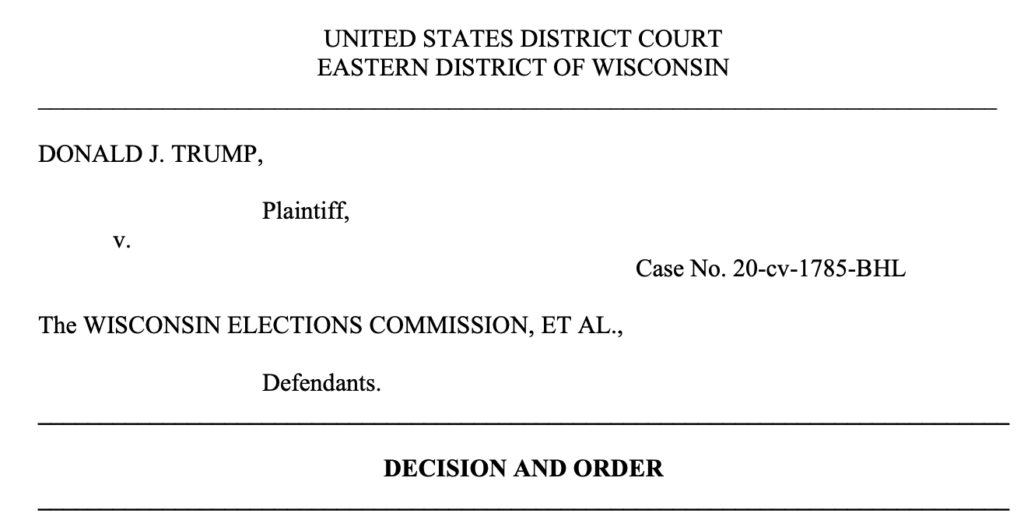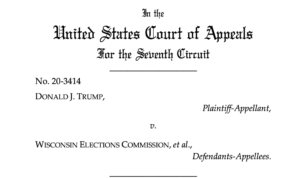The Wisconsin case of Trump v. WEC, the “Elector’s Clause,” and alleged “failed elections” under the Presidential Election Day Act of 1845
In a prior post, Statutesandstories discussed the Presidential Election Day Act of 1845 and the Election of 1840. Click here for a link. This post is intended to provide an update regarding the “failed election” clause of the 1845 Act, which was raised by President Trump, but rejected by Judge Ludwig.
Following the Presidential election of 2020, the state of Wisconsin certified that President Trump was defeated by a narrow margin of just over 20,600 votes. Because the election was so close, the President sought recounts in Wisconsin’s two largest counties. The recounts in Milwaukee and Dane counties ultimately increased Biden’s lead.
Nevertheless, in the case of Trump v. Wisconsin Election Commission the President’s lawyers alleged that the election was a “failed election” under the 1845 Act (3 U.S.C. § 2). If in fact an alleged failure to comply with Wisconsin law resulted in a failed election, this would open the door for the Wisconsin Legislature to appoint its own slate of Presidential Electors.
Under the President’s legal theory, a failed election would violate the “Elector’s Clause” in Article II, Section 1, Clause 2 of the U.S. Constitution (providing that “Each State shall appoint, in such Manner as the Legislature thereof may direct…”).

Federal District Court Judge Brett Ludwig (a Trump appointee) rejected this argument on the merits and dismissed the case on December 12, 2020. In a detailed opinion, Judge Ludwig concluded that the President failed to show a clear departure from Wisconsin election law, established by the Wisconsin Legislature. As such, there was no constitutional violation to be addressed in federal court:
Plaintiff’s Electors Clause claims fail as a matter of law and fact. The record establishes that Wisconsin’s selection of its 2020 Presidential Electors was conducted in the very manner established by the Wisconsin Legislature, “[b]y general ballot at the general election.” Wis. Stat. §8.25(1). Plaintiff’s complaints about defendants’ administration of the election go to the implementation of the Wisconsin Legislature’s chosen manner of appointing Presidential Electors, not to the manner itself. Moreover, even if “Manner” were stretched to include plaintiff’s implementation objections, plaintiff has not shown a significant departure from the Wisconsin Legislature’s chosen election scheme.
This is an extraordinary case. A sitting president who did not prevail in his bid for reelection has asked for federal court help in setting aside the popular vote based on disputed issues of election administration, issues he plainly could have raised before the vote occurred. This Court has allowed plaintiff the chance to make his case and he has lost on the merits. In his reply brief, plaintiff “asks that the Rule of Law be followed.” (Pl. Br., ECF No. 109.) It has been.
Click here for a link to Judge Ludwig’s Order.
Professor Richard Phildes’ proposals
In an OpEd in the New York Times, NYU Law Professor Richard Phildes has suggested that the so-called “failed election” provision of the Presidential Election Day Act is outdated and should be removed. Click here for a link. Codified in 3 U.S.C. § 2, the “failed election” clause provides as follows:
Whenever any State has held an election for the purpose of choosing electors, and has failed to make a choice on the day prescribed by law, the electors may be appointed on a subsequent day in such a manner as the legislature of such State may direct.
According to Phildes, this obscure provision is a “dangerous loaded weapon” since the Election Day Act does not define what it means for an election to have “failed.” While the provision has not been invoked since the Civil War, President Trump pursued a strategy after the 2020 election of calling upon governors and swing state legislatures to appoint presidential electors, overriding the popular vote.
Phildes explains that, “It is the only place in federal law that identifies circumstances in which, even after a popular vote for president has been taken, a state legislature has the power to step in and appoint electors.” Because the original purpose of the “failed election” provision no longer applies, Phildes suggests that the law be modernized to shore up the foundation of American democracy.
Statutesandstories.com agrees with Professor Phildes that when the dust settles a thoughtful review of the 1845 Act would be a useful exercise.
POST SCRIPT: On Christmas Eve, the 7th Circuit Court of Appeals unanimously affirmed Judge Ludwig’s decision. Here is a link to the 7th Circuit Opinion by Judges Flaum, Rovner and Scudder (who were all appointed by Republican Presidents).
According to the decision affirming Judge Ludwig:
On the merits, the district court was right to enter judgment for the defendants. We reach this conclusion in no small part because of the President’s delay in bringing the challenges to Wisconsin law that provide the foundation for the alleged constitutional violation. Even apart from the delay, the claims fail under the Electors Clause.
…Put another way, the errors that the President alleges occurred in the Commission’s exercise of its authority are in the main matters of state law. They belong, then, in the state courts, where the President had an opportunity to raise his concerns. Indeed, the Wisconsin Supreme Court rejected his claims regarding the guidance on indefinitely confined voters, see Trump v. Biden, 2020 WI 91 ¶ 8 (Dec. 14, 2020), and declined to reach the rest of his arguments on grounds of laches.
For our part, all we need to say is that, even on a broad reading of the Electors Clause, Wisconsin lawfully appointed its electors in the manner directed by its Legislature.
